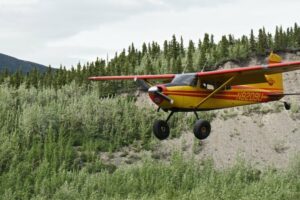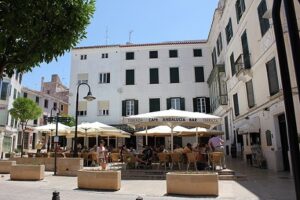The Peace Corps Years–Yes, Those Were The Days
Back in the mid-sixties when I was an APCD in Ethiopia, a year after my tour as a PCV secondary school English teacher in Addis Ababa, I did a lot of flying on Ethiopia’s Airlines small fleet of single engine prop planes, piloted by young French guys all new to the Empire.
It was difficult flying, even in the best of weather, over the vast terranes and high plateaus, and across the Semien and Bale Mountains, the Danakil Depression, where you would feel the fierce winds, and always had to land the small propeller plane on a narrow dirt runways in the middle of nowhere.
Still, it was breathtaking to sail across endless kilometers and see tiny tukul houses dotting the hills as if they were nothing more than birthmarks on the African landscape. I was seeing Africa up-close and personal. It was my own special view of the vastness and specialness of this continent.
At the time, as an APCD, I was responsible for about a hundred Volunteers spread over a thousand miles on the two main arteries of the Empire, the Dessie and Gondar Roads, named after the major towns on these mountain roads.
Off these roads, deep in the interior, were villages where PCVs could only be visited by plane. One of those town was Debre Tabor where two Volunteers elementary school teachers were stationed, and who I had personally selected for this remote and difficult assignment.
The year before they arrived, two PCVs assigned to the town were discovered to be growing marijuana in their compound. As this was the early days of the Peace Corps, at the height of Jack Hood Vaughn administration, growing drug in one’s backyard was a real no-no.
Our Peace Corps Director sent up to Debre Tabor the only ‘hip” guy we had on the Peace Corps Staff—Jim Thompson–to burn the “grass” in the volunteer’s compound. He did is, later joking in a staff meeting that he had “turned on” the whole town by doing so.
The two PCVs were terminated and sent home.
The new PCVs I assigned to Debre Tabor were sinless guys, and ready for the Peace Corps life.
I visited them once a month by catching a regular DC 3 flight into the town, but sometimes I had to charter a small plane with a French bush pilot to take the hour long flight to the north central Ethiopia village in the Amhara Region of the country.
I should mention that all the pilots of these Piper Cubs were young guys who I’m guessing imagined themselves to be Flying Tigers. I usually got the same guy whose name was, as I recall, Jean Demettre. He spoke little English. I spoke little French. But we were about the same age, in our twenties. Small and good looking, I still remember how he would stand by the small propeller plane with a cigarette hanging from his lips, looking like the French actor Jean Cocteau.
Flying on these trips, we didn’t talk much. The small propeller was too noisy for conversation, but we had worked out a few hand signals. Approaching Debre Tabor, he’d poke me and point, and there on the horizon was a patch of buildings, tukel houses, even a Seventh-Day Adventist Missionary.
I’d watch Debre Tabor come into view as if I were adjusting a fine pair of binoculars. Our landing strip was a stretch of mowed grass with a small shed at one end. And always, the runway was crowded with grazing cattle.
Before landing, Jean would nose dive over the town, buzz the elementary school to let the PCVs know “Coyne had arrived.”
Looking down as our plane banked, I’d see students tumbling out of school windows knowing someone important had arrived in their village. A plane buzzing their school was the most exciting thing that ever happened in them.
Jean would turn our plane out of town and head for the landing strip. He’d sweep down a second time to chase the grazing cattle away, swearing in French as the reluctant herd. Once the livestock was gone, he’d dive down once more onto the mountain top, cut the engine, and we’d roll to a stop within striking distance of the EAL shed, locked up and abandoned as no scheduled flights were scheduled that day for Debre Tabor.
Ethiopia Airlines had packed food for us, and Jean and I would sit in the shade of the plane’s wing and eat lunch while waiting for one of the guys to ride out with an extra horse for me. Then we’d ride a few miles back into town, surrounded by school kids who had come to see who had arrived and were carrying whatever luggage and supplies I had brought for the Volunteers, guessing there might be treats for them.
Before leave the landing strip, I’d shake hands with Jean, thank him, and say goodbye. Then we would all stand back and watch the plane take off again. It was something special for watch.
This mountain top landing strip required that Jean head off over a cliff, building up speed as he raced to the edge and then drop out of sight at the end of the runway, and magically rise again as the plane’s powerful engine and strong current swept up from the deep gorge sent Jean flying safely away, heading home to Addis.
It was breathtaking, beautiful, with just a touch of danger. Jean and I became friends over my trips that year to Debre Tabor. We were young, living in the middle of nowhere, and having a hell of a time.
After I finished my two year as the APCD in Ethiopia, I went to live for several months on the beautiful Mediterranean island of Menorca and finished writing a novel in the quiet and warmth of this Balearic Islands.
One peaceful morning, after having my usual breakfast in an outside café in the town of Mahon, drinking café con leche and enjoying the island’s famous ensaimada, I opened the International Herald Tribune and spotted a short article about Ethiopia.
I was surprised and delighted, but then I read how the new Greek Ambassador to the Empire had been killed in a plane accident. The pilot also was killed. Their small propeller plane had not been able to reach a high enough altitude when taking off from the landing strip in Kombolcha, located just below the town of Dessie. The Piper Cub crashed into the side of the mountain, killing them both. The pilot was Jean Demettre. He was my Jean Demettre, dying tragically at twenty-seven.
I had escaped the hazards of flying propeller planes across the mountains of Ethiopia to live now a life on a small, calm island in the Mediterranean.
Today, whenever I return to Menorca and see the lovely island from the plane window as we descend into Mao Airport, I think of the mountains of Ethiopia and my Piper Cub flights with the French bush pilot Jean Demettre. Yes, those were the days.


It’s a remarkable story, John. No mountaintops, just snow, in mine. In the early/mid-1990s, Russia was a cash economy and with few ATMs. The regional Volunteer leaders flew monthly to Saratov, on the Volga River, or Moscow to retrieve the living allowances, carrying back a few thousand dollars worth of rubles in backpacks. Weather wasn’t a reason to cancel a flight, and in winter, the pilot of the Friday evening run from Rostov to Saratov (4-5 hours) often took off in a blizzard and landed on snow or ice in the middle of the airfield. A small ladder was extended from the 19-seat prop plane, and we walked the half-kilometer to the one-room terminal and boarded a bus or taxi or hitched a ride into town.
John,
I greatly appreciated your bringing those days of vivid remembrance into a contemporary context. Right, those were the days. In my circumstance, as we 23 Co-op Volunteers were handed assignments as to site postings, I noted that all my friends were being assigned to large cities, like Cali, while I had drawn a site called La Plata. I asked the PC Country Director where it was because I could not locate it on map. He got out a larger map, directed my finger to a red line denoting a river running south and east and then said: see that red dot on the bend of the river–that’s La Plata. Stunned into silence, I finally asked: “why are you sending me there”. He responded, rather casually, “oh, that’s because you are the only one in your Group with combat experience (I had served in North Korea)|!”. A few days later, once arriving in La Plata, I could find no city official that had requested a Co-op Volunteer–then nor in the following two years of my posting there. So, I simply made do with the situation at hand and went on to develop several ag Co-ops.